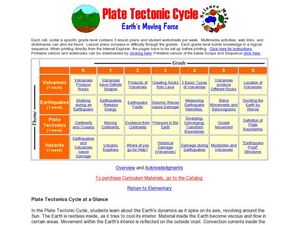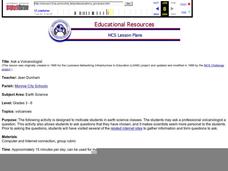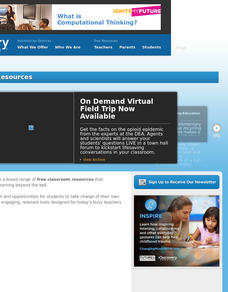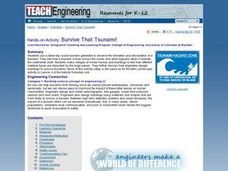Curated OER
Rocks and Minerals
In this earth science activity, students use the clues given at the bottom of the sheet to solve the crossword puzzle on mineral and rocks. They identify the various types of rocks formed and specific examples of these rocks.
Curated OER
A Hydrothermal Adventure
Students analyze hydrothermal vents. In this hydrothermal vents lesson, students discover the effects of hydrothermal vents on tectonic plates. Students make model hydrothermal vents to understand how they form and operate.
Curated OER
Kinds of Volcanic Eruptions
In this volcanic eruption worksheet, students will read descriptive information about four types of volcanic eruptions: Hawaiian, Strombolian, Vulcanian, and Pelcean. Then students will identify 4 figures of eruptions as one of these...
Curated OER
Plate Tectonic Cycle
Students explore the Earth's movements by completing worksheets. In this plate tectonics lesson, students define such natural disasters as volcanoes, earthquakes, tsunamis and mudslides and discuss their connections to plate tectonics....
Curated OER
Landforms - Landform Types (Matching)
For this landforms worksheet, learners match land forms with their definitions. Students complete 11 matches total on this worksheet.
Curated OER
Ask a Volcanologist
Students ask a professional volcanologist a question online. This lesson allows students to ask questions that they have chosen, and it makes scientists seem more personal to Students.
Curated OER
Cruising the Mantle
Young scholars explore the plate boundaries of the earth. Through the use of video, internet and hands-on activities, students examine the types of plate boundaries. They create a model to illustrate the movement and interaction of the...
Curated OER
Plate Tectonics Study Guide
In this plate tectonics worksheet, students answer questions about plate tectonics including topics such as the lithosphere, the asthenosphere, rising and sinking convection currents, continental drift and the types of boundaries.
Curated OER
Theory of Plate Tectonics
In this plate tectonics worksheet, student answer 15 multiple choice questions about plate movement, types of boundaries, collision of plates, continental plates, and the lithosphere.
Curated OER
Living with Disaster: Mother Nature Rules
Students analyze various types of natural disasters and discover techniques man uses to live with nature and to control nature. They are able to identify ways that man has learned to predict natural disasters; identify ways that man has...
Curated OER
Coasts
Students explain the different types of marine coasts and where they are located in the United States and its territories. They explain and identify some of the life forms that inhabit different marine coastal regions.
Curated OER
TE Activity: Survive That Tsunami!
Students examine the causes of tsunamis and observe a table top wave making machine. They make model houses while working in groups so that the can see how different construction types work. They discuss how engineers can design and...
Curated OER
Exploring Plate Tectonics
In this plate tectonics worksheet, students answer questions about plate movement, the types of boundaries, the history of Earth's crusts and plate tectonics. They use an on line source to get their answers.
Curated OER
Layers of the Earth
In this earth science worksheet, students read about the characteristics of the Earth's layers such as the mantle, core, and crust. They answer 10 mixed type questions using the online application.
Curated OER
Plate Tectonics Review
In this plate tectonics worksheet, students review concepts such as the types of plate boundaries, the concept of continental drift, sea-floor spreading, earthquakes, and plate tectonics. They match 30 terms with their definitions.
Curated OER
Integrating Physical Science and the Geological Environment
Students undertake a series of experiments and activities related to geology, especially in Connecticut. They evaluate types of rocks, minerals, and crystals, exploring the main concepts of geology.
Curated OER
Rock Cycle
Third graders identify various types of landforms of the United States. They discuss earth movements that produce geologic structures and landforms and define cycle as it relates to rocks and soil. They demonstrate the processes forming...
Curated OER
Extreme Weather!
Students create a web page explaining a specfic type of extreme weather and identify recent examples of the weather occurance. They form small groups to research the weather type and build an HTML word document to share with classmates...
Curated OER
Worksheet 3 Vocabulary Review: Words That Mean the Same
In this synonyms instructional activity, students read 10 sentences and analyze the word in bold type. From two choices, students circle the letter of a word or phrase that means the same.
Curated OER
Aerosol Science
In this aerosol activity, students are given data for volcanic eruptions and the average temperatures of the Earth. They determine the change in temperature from the year of the eruption to the present year and use the means to determine...
Science Matters
Earthquake Waves: Wave Notes
A multi-part lesson opens with a review of p waves and s waves. Then scholars use a simple s wave simulator to view the way the wave travels. Next, pupils use cups and various fluids to simulate p waves moving through different mediums....
Science Matters
Slip Sliding Along
The San Andreas Fault is the largest earthquake-producing fault in California. In the seventh lesson in the 20 part series, pupils create maps of California, focusing on the San Andreas Fault system. The comparison of where California is...
Science Matters
Fault Formations
The San Andreas Fault moves about two inches a year, approximately the same rate fingernails grow—crazy! The third lesson in the series allows for hands-on exploration of various fault formations. Through the use of a Popsicle stick,...
Science Matters
Spaghetti Fault Model
Does increasing the pressure between two moving plates provide a stabilizing force or create more destruction? The hands-on lesson encourages exploration of strike-split fault models. The sixth lesson in a 20-part series asks scholars to...

























